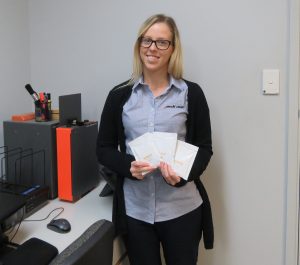Ingot check the rolled gold of feed grain checks
May 29, 2018
With grain the major and costly ingredient in pig diets and contributing much of the dietary energy, Australian pork producers are increasingly demanding that grains they feed have been accurately measured for their available digestible energy (DE).
According to Pork CRC Commercialisation and Research Impact Manager, Charles Rikard-Bell, this is particularly the case today, with a megajoule (MJ) of digestible energy (DE) worth $20 to $35, depending on the grain price.
“This is why AusScan’s pig faecal DE calibration, which predicts the DE of cereal grains with an accuracy of +/- 0.26 MJ, has become vital to pig farming in Australia, as it allows nutritionists to formulate the most cost effective diet,” Dr Rikard-Bell said.
A big advantage of using near infrared reflectance spectroscopy (NIRS) calibrations is the speed of the result, with a laboratory with access to AusScan Online able to scan a sample of grain and download results in seconds.
However, Dr Rikard-Bell said that while customers knew the calibrations were accurate, they also needed to be confident that the laboratory’s NIRS machine was accurate, routinely monitored and consistent.
“This is why Australian AusScan users recently joined Aunir UK’s successful quality assurance scheme, Ingot Check, which provides users with a monthly report on the stability of the NIRS hardware and calibrations which can then be submitted to auditors, providing independent proof of the laboratory’s competency.
‘The key to Ingot Check’s success is the timely distribution of uniform reference samples to laboratories across the globe, with samples carefully prepared in the UK from a single source, identified and vacuum packed in high quality, UV resistant sachets, ensuring the samples reach target destinations in original condition.
“The uniformity of the Ingot Check sachets minimises sampling preparation errors and allows variation within and between NIR machines to be properly examined,” he said.
Graduate nutritionist and Pork CRC IPP, Haylee Clifford, manages AusScan at Alltech Lienert at Roseworthy, South Australia.
“Alltech Lienert welcomes the opportunity to be involved with Ingot Check and AusScan, as Ingot Check testing now allows us to benchmark our testing and find ways to improve the service we currently provide our customers,” Ms Clifford said.
While Ingot Check has operated in Australian laboratories since June 2017, in February, 2018 Aunir Technical Director, Chris Piotrowski and Commercial Manager, Richard Wynn, along with Pork CRC, Commercialisation and Research Impact Manager, Charles Rikard-Bell, held quality assurance workshops for Australian users of AusScan.
The workshops also addressed laboratory specific issues, provided training in other uses for NIRS machines and, according to Dr Rikard-Bell, the Aunir visit informed and satisfied nutritionists and feed formulators who use AusScan calibrations.
The monthly Ingot Check, which has superseded the much less frequent AusScan ring test, markedly reduces sample variation and is predominantly an internet based service.
Aunir UK takes a central role in the preparation and distribution of reference samples for laboratories to scan and upload results through the Ingot Check online system.

Graduate nutritionist and Pork CRC IPP, Haylee Clifford, with grain samples for AusScan testing in the Alltech Lienert laboratory at Roseworthy, South Australia.



